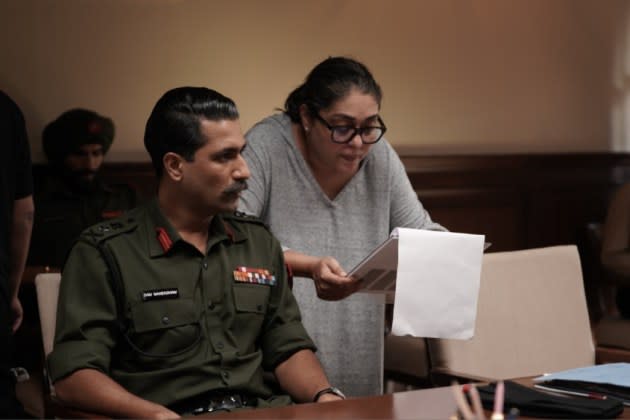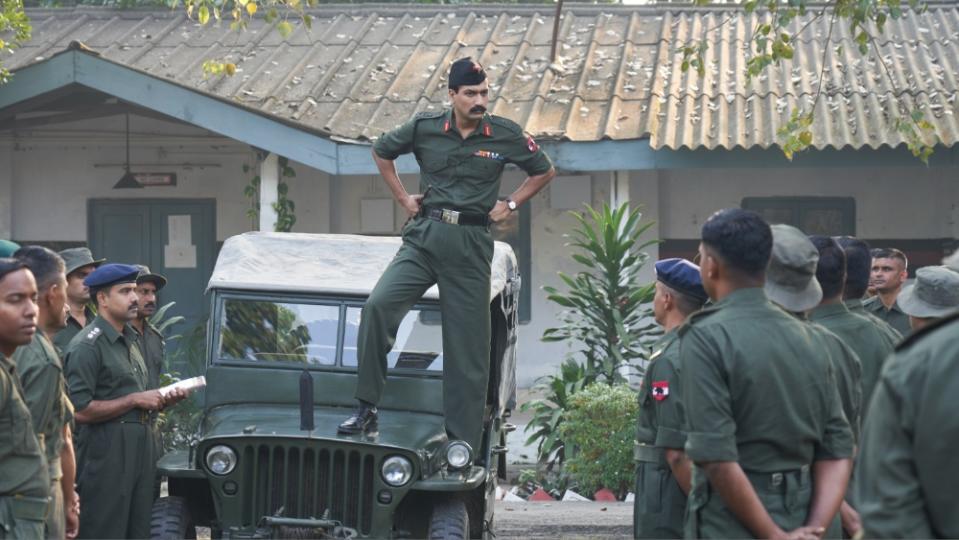Meghna Gulzar Was Obsessed by Detail as She Depicted an Indian War Hero in ‘Sam Bahadur’: ‘It Was Interesting Thinking Like a Man’

“Sam Bahadur,” a biopic of Indian war hero Field Marshal Sam Manekshaw, is the latest feature from Meghna Gulzar.
Ronnie Screwvala’s RSVP Movies produced the film, which released theatrically in December 2023 and proved to be a box office success. The cast is led by Vicky Kaushal (“Dunki”) as Manekshaw and also includes Sanya Malhotra (“Jawan”) as his wife Silloo and Fatima Sana Shaikh as Indian Prime Minister Indira Gandhi.
More from Variety
Ranbir Kapoor, Alia Bhatt, Vicky Kaushal to Headline Sanjay Leela Bhansali's 'Love & War'
ZEE5 Global Expands U.S. Presence, Aggregating Add-On South Asian Streaming Platforms
ZEE5 Global Grows 35% in the U.S. as Drama and Comedy Score With South Asian Diaspora Audience
Gulzar’s previous films include “Talvar” (2015), starring Irrfan Khan and Konkona Sen Sharma, and “Raazi” (2018), headlined by Alia Bhatt, both of which were critical and commercial successes and “Chhapaak” (2020), featuring Deepika Padukone as an acid attack victim. She was looking for a subject to work on with Screwvala, who suggested the Manekshaw biopic as the late Field Marshal’s daughters had been in conversation with him about wanting to make a film based on their father.
“I immediately said yes, because I just knew two things about him at that time, which is that he was the first Field Marshal of India, and that he was the Chief of Army Staff during the 1971 war [the India-Pakistan war that led to the creation of Bangladesh]. And just that much in itself was extremely inspiring and fascinating. And I really thought that somebody who has achieved those positions in life, they definitely must be having a story to tell,” Gulzar told Variety.
The filmmaker describes tackling what is an overwhelmingly male subject despite the presence of two strong women in the narrative, as “a lot of relief.” “I have been telling stories, which I wouldn’t say are women-centric, but the central character is feminine, or the nature of the subject is slightly more feminine,” Gulzar said. “What was most challenging was that to tell a man’s story, to think about how a male character would think, how they would evaluate things, or what would their expressions be and what would their reactions be? Fortunately, because this is not fiction, most of the cues were already in place, because you are just executing [a story about] a life that has already been lived. It was interesting to think like a man and characterize a man and, and that man more than anything.”
The film was made with the close cooperation of the Indian Army. Current Indian Army personnel played all the rank and file soldier roles in the film, not extras. All military depictions were vetted by an army department liaising with the production. Only some of Manekshaw’s dialogues with his wife and cook were fictionalized, with the rest drawn from interviews with him, published accounts and conversations that the project researchers had with his family, daughters, grandchildren and associates.
“Because he is such an important figure in our army’s history and is so revered by our forces, you can’t [afford to] go wrong with it, you can’t get anything about him wrong – or even around him. So, getting that authenticity and that detailing, right, was extremely challenging, but the entire team muscled through and our research was rock solid,” Gulzar said. “The entire team knew that our intent is that this is going to be error free. Absolutely zero error. And they all came with that dedication.”

The film features several interactions between Manekshaw and Indira Gandhi, who would go on to become the Prime Minister of India. “None of that is fictionalized,” Gulzar said. “Because we’re executing it and there are actors playing a part, there is a line that we have to balance. We have to be aware of maintaining that balance, that there is an affinity there. Yet, it’s not a gender thing, that there is immense mutual respect, even though there is antagonism sometimes. The tricky part was actually hitting that right tone for the actors, even for me.”
Despite the film’s many references to conflicts with China and Pakistan, it steers clear of jingoism. “I didn’t have to because that’s the man that he was. If that is how he thought and that is what he believed, that is what I have to express as well in the film, through the character and through the staging,” Gulzar said. “He was humane even to the prisoners of war that he had, 93,000 of them. So, how can there be any [demonizing] in the film?”
“Sam Bahadur” is streaming now on ZEE5 Global. “It’s like a second life cycle of the film, which is extremely beneficial in today’s times. And then that is where it will eventually stay for posterity,” Gulzar said.
Best of Variety
Sign up for Variety’s Newsletter. For the latest news, follow us on Facebook, Twitter, and Instagram.

 Yahoo News
Yahoo News 
